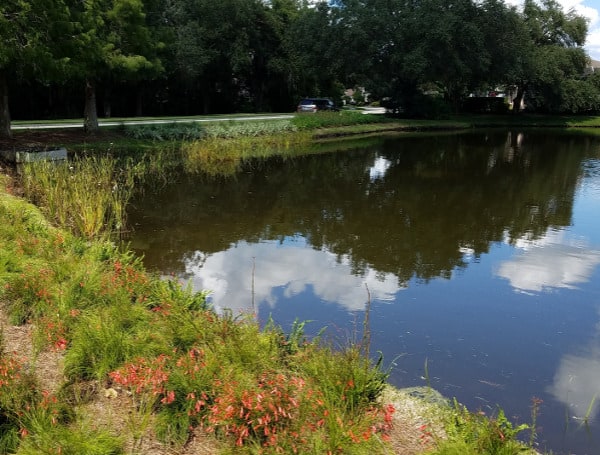For years, scientists questioned the ability of stormwater ponds to keep nutrients out of lakes and rivers. Turns out, they were right to be suspicio
For years, scientists questioned the ability of stormwater ponds to keep nutrients out of lakes and rivers. Turns out, they were right to be suspicious, new University of Florida research shows.
Stormwater ponds are built to prevent soil erosion and flooding. They’re also considered a Best Management Practice, or BMP, to reduce pollutants from flowing into natural water bodies. They’re good at the former and not as good as they could be at the latter.
These ponds are supposed to remove 80% of phosphorus, nitrogen, and suspended solids from stormwater, but previous research shows they often remove only about 50% and sometimes less.
For the newly published research, scientists studied stormwater detention ponds in the Gainesville area, but they said they can apply their findings to most other urban areas of Florida.
People often use the terms “detention” and “retention” ponds interchangeably, UF/IFAS researchers say. But a detention pond holds water permanently, while a retention pond is normally dry, except when it rains, then it fills up with water.
“In our study, we found little to no evidence that stormwater detention ponds protect natural water bodies that they are intended to protect,” said Basil Iannone, a UF/IFAS assistant professor of urban ecology. “We found that if we are going to continue to use detention ponds as a BMP, we need to find ways to make them effective – including a planting project that we’re experimenting with — or we need to rely on another strategy to protect Florida’s natural waterbodies.”
That’s why scientists are looking for more efficient BMPs.
As part of that quest, scientists evaluated how well detention ponds protect natural water bodies from nutrients. They conducted their experiment using several methods:
- Researchers quantified hydrological, chemical, and biological responses in urban depressional wetlands (low-lying areas with water).
- They also compared urban wetlands with detention ponds draining into them vs. those without detention ponds draining into them.
- Lastly, scientists compared differences between urban vs. non-urban depressional wetlands, the latter not being impacted by urban stormwater runoff.
The study showed urban wetlands wound up having more nutrient-rich and alkaline waters and more nonnative and native plants tolerant of these conditions, said Iannone, who supervised the new research, led by one of his master’s graduates, Kayla Hess.
Iannone stresses the need to evaluate broadly adopted BMPs before assuming they will work. Here are a couple of those BMPs to which he refers: If you want to follow BMPs with stormwater ponds, don’t mow the edges of ponds. Also, avoid putting yard waste — for example, leaves and grass clippings — in stormwater drains or creeks.
Another tip, this one from Hess: People who install stormwater ponds might also consider putting in a debris filter. This practice can capture lawn debris before it enters the detention pond.
“In the end, our research is among a growing number of studies showing evidence that stormwater ponds — a commonly used BMP to prevent stormwater pollution from getting into nearby lakes, rivers and saltwater bodies — is not working,” said Iannone, a faculty member in the UF/IFAS School of Forest, Fisheries and Geomatic Sciences.
Visit Tampafp.com for Politics, Tampa Area Local News, Sports, and National Headlines. Support journalism by clicking here to our GiveSendGo or sign up for our free newsletter by clicking here.
Android Users, Click Here To Download The Free Press App And Never Miss A Story. Follow Us On Facebook Here Or Twitter Here.


COMMENTS